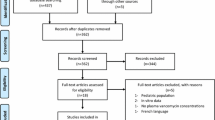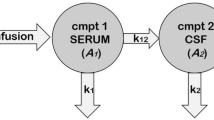Abstract
Largely because of their low lipophilicity, cephalosporins poorly penetrate through the blood-brain barrier, achieving relatively low cerebrospinal fluid (CSF) concentrations. However, the minimum bactericidal concentrations (MBCs) of the extended spectrum cephalosporins for common meningeal pathogens are generally low; thus, therapeutic CSF drug concentrations several-fold greater than the MBC can be achieved with currently recommended dosage regimens. However, the effectiveness of cephalosporin therapy is unreliable in patients with meningitis caused by highly penicillin-resistant pneumococci.
As in other body sites, the bactericidal activity of cephalosporins in CSF predominantly depends on the time their concentrations exceed the MBC of infecting organisms (t>mbc ). Experimental studies show that, for maximal efficacy, t>mbc values greater than 90% of the dosage interval are required in meningitis. Such values are usually achieved in humans with currently recommended dosage regimens because the half-lives of cephalosporins are 2- to 3-fold longer in CSF than in serum.
Several advanced generation cephalosporins have shown equal efficacy in clinical trials, but only cefotaxime, ceftriaxone and ceftazidime are currently approved for the treatment of patients with bacterial meningitis.





Similar content being viewed by others
References
Saez-Llorens X, McCracken GH. Antimicrobial and anti-inflammatory treatment of bacterial meningitis. Infect Dis Clin North Am 1999; 13 (3): 619–36.
Quagliarello VJ, Scheid WM. Drug therapy: treatment of bacterial meningitis. N Engl J Med 1997; 336: 708–16.
Tsai HY, Bies M, Leitner F, et al. Therapeutic studies of cefepime (BMY 28142) in murine meningitis and pharmaco-kinetics in neonatal rats. Antimicrob Agents Chemother 1990; 34: 733–8.
Spector R. Ceftriaxone pharmacokinetics in the central nervous system. J Pharmacol Exp Ther 1996; 236: 380–3.
Spector R. Ceftriaxone transport through the blood-brain-barrier. J Infect Dis 1987; 156: 209–11.
Nau R, Prange HW, Muth P, et al. Passage of cefotaxime and ceftriaxone into cerebrospinal fluid of patients with uni-nflamed meninges. Antimicrob Agents Chemother 1993; 37: 1518–24.
Nau R, Prange HW, Kinzig M, et al. Cerebrospinal fluid ceftazidime kinetics in patients with external ventriculostomies. Antimicrob Agents Chemother 1996; 40: 763–6.
Humbert G, Leroy A, Ramachandran N, et al. Concentrations of cefotaxime and desacetyl metabolite in serum and CSF of patients with meningitis. J Antimicrob Chemother 1984; 13: 487–94.
Trang JM, Jacobs RF, Kearns GL, et al. Cefotaxime and desacetylcefotaxime pharmacokinetics in infants and children with meningitis. Antimicrob Agents Chemother 1995; 28: 791–5.
Saez-Llorens X, Castano E, Garcia R, et al. Prospective randomised comparison of cefepime and cefotaxime for treatment of bacterial meningitis in infants and children. Antimicrob Agents Chemother 1995; 39: 937–40.
Steele RW, Eyre LB, Bradsher RW, et al. Pharmacokinetics of ceftriaxone in pediatrie patients with meningitis. Antimicrob Agents Chemother 1983; 23: 191–4.
Friedland IR, Sultan E, Lehr KH, et al. Concentration of cefpirome in cerebrospinal fluid of children with bacterial meningitis after a single intravenous dose. Antimicrob Agents Chemother 1998; 42: 199–201.
Lutsar I, Friedland IR, McCracken GH. Antibiotic pharmaco-dynamics in cerebrospinal fluid. Clin Infect Dis 1998; 27: 1117–29.
Nau R, Sörgel F, Prange HW. Pharmacokinetic optimisation of the treatment of bacterial central nervous system infections. Clin Pharmacokinet 1998; 25: 223–46.
Andes DR, Craig WA. Pharmacokinetics and pharmacodynamics of antibiotics in meningitis. Infect Dis Clin North Am 1999; 13: 595–618.
Quagliarello VJ, Long WJ, Scheid WM. Morphologic alterations of the blood-brain-barrier with experimental meningitis in the rat. J Clin Invest 1986; 77: 1084–95.
Chandrasekar PH, Rolston KVI, Smith BR, et al. Diffusion of ceftriaxone into the cerebrospinal fluid of adults. J Antimicrob Chemother 1984; 14: 427–30.
Perfect JR, Durack DT. Pharmacokinetics of cefoperazone, moxalactam, cefotaxime, trimethoprim and sulphamethoxazole in experimental meningitis. J Antimicrob Chemother 1981; 8: 49–58.
McCracken GH, Nelson JD, Grimm L. Pharmacokinetics and bacteriological efficacy of cefoperazone, cefuroxime, ceftriaxone, and moxalactam in experimental Streptococcus pneumoniae and Haemophilus influenzae meningitis. Antimicrob Agents Chemother 1982; 21: 262–7.
Raddatz JK, Ostergaard BE, Rotschafer JC. Therapeutic options for cefotaxime in the management of bacterial infections. Diagn Microbiol Infect Dis 1995; 22: 77–83.
Blumer JL, Aronoff SC, Myers CM, et al. Pharmacokinetics and cerebrospinal fluid penetration of ceftazidime in children with meningitis. Dev Pharmacol Ther 1985; 8: 219–31.
Chadwick EG, Yogev R, Shulman ST, et al. Single-dose ceftriaxone pharmacokinetics in pediatrie patients with central nervous system infections. J Pediatr 1983; 102: 134–7.
Reynolds JEF, Parfitt K, Parson AV, et al. The extra pharmacopoeia. 31st ed. London; Royal Pharmaceutical Society, 1996: 129.
Doit C, Barre J, Cohen R, et al. Bactericidal activity against intermediately resistant Streptococcus pneumoniae in cerebrospinal fluid of children with bacterial meningitis treated with high doses of cefotaxime and vancomycin. Antimicrob Agents Chemother 1997; 41: 2050–2.
Friedland IR, Klugman KP. Cerebrospinal fluid bactericidal activity against cephalosporin-resistant Streptococcus pneumoniae in children with meningitis treated with high dosage cefotaxime. Antimicrob Agents Chemother 1997; 4: 1888–91.
Craig WA. Pharmacokinetic/pharmacodynamic parameters: rationale for antibacterial dosing of mice and men. Clin Infect Dis 1998; 26: 1–12.
Täuber MG, Doroshow CA, Hackbarth CJ, et al. Antibacterial activity of ß-lactam antibiotics in experimental meningitis due to Streptococcus pneumoniae. J Infect Dis 1984; 149: 568–74.
Täuber MG, Hackbarth CJ, Scott KG, et al. New cephalosporins cefotaxime, cefpimizole, BMY 28142, HR-810 in experimental pneumococcal meningitis in rabbits. Antimicrob Agents Chemother 1985; 27: 340–2.
Lutsar I, Ahmed A, Friedland IR, et al. Pharmacodynamics and bactericidal activity of ceftriaxone therapy in experimental cephalosporin-resistant pneumococcal meningitis. Antimicrob Agents Chemother 1997; 41: 2414–7.
Nau R, Schmidt T, Kaye K, et al. Quinolone antibiotics in therapy of experimental pneumococcal meningitis in rabbits. Antimicrob Agents Chemother 1995; 39: 593–7.
Schaad UB, McCracken GH, Loock CA, et al. Pharmacokinetics and bacteriologie efficacy of moxalactam, cefotaxime, cefoperazone, and rocephin in experimental bacterial meningitis. J Infect Dis 1981; 143: 156–63.
Eagle H, Musselman AD. The slow recovery of bacteria from the toxic effects of penicillin. J Bacteriol 1949; 58: 475–90.
Craig WA. Postantibiotic effects in experimental infection models: relationship to in vitro phenomena and to treatment of infections in man. J Antimicrob Chemother 1993; 31 Suppl. D: 149–58.
Zhanel GG, Karlowsky JA, Davidson RJ, et al. Effect of pooled human cerebrospinal fluid on the postantibiotic effects of cefotaxime, ciprofloxacin, and gentamicin against Escherichia coli. Antimicrob Agents Chemother 1992; 36: 1136–9.
Kim KS, Manocchio M, Bayer AS. Efficacy of cefotaxime and latamoxef for Escherichia coli bacteriemia and meningitis in newborn rats. Chemotherapy 1984; 30: 262.
Levinson ME. Pharmacodynamics of antimicrobial agents. Infect Dis Clin North Am 1995; 9: 483–95.
Kim KS. Comparison of cefotaxime, imipenem-cilastin, ampicillin-gentamicin, and ampicillin-chloramphenicol in the treatment of experimental Escherichia coli bacteriemia and meningitis. Antimicrob Agents Chemother 1985; 28: 433–6.
Kim KS. Efficacy of cefomenoxime in experimental E. coli bacteriemia and meningitis. Antimicrob Agents Chemother 1985; 28: 389–92.
Lutsar I, Friedland IR, Jafri HS, et al. Efficacy of gatifloxacin in experimental Escherichia coli meningitis. Antimicrob Agents Chemother 1999; 43: 1805–7.
Scholz H, Hofman T, Noack R, et al. Prospective comparison of ceftriaxone and cefotaxime for the short-term treatment of bacterial meningitis. Chemotherapy 1998; 44: 142–7.
Saez-Llorens X, Castano E, Garcia R, et al. Prospective randomised comparison of cefepime and cefotaxime for treatment of bacterial meningitis in infants and children. Antimicrob Agents Chemother 1995; 39: 937–40.
Spangler SK, Jacobs MR, Appelbaum PC. Susceptibilities of 177 penicillin-susceptible and -resistant pneumococci to FK 037, cefpirome, cefepime, ceftriaxone, cefotaxime, ceftazidime, imipenem, biapenem, meropenem, and vancomycin. Antimicrob Agents Chemother 1994; 38: 898–900.
Schaad UB, Suter S, Gianella-Borradori A, etal. Acomparison of ceftriaxone and cefuroxime for the treatment of bacterial meningitis in children. N Engl J Med 1990; 332: 141–7.
McCracken GH, Sakata Y. Antimicrobial therapy of experimental meningitis caused by Streptococcus pneumoniae strains with different susceptibilities to penicillin. Antimicrob Agents Chemother 1985; 27: 141–5.
Cabellos C, Viladrich PF, Verdaguer R, et al. A single dose of ceftriaxone for bacterial meningitis in adults: experience with 84 patients and review of the literature. Clin Infect Dis 1995; 20: 1164–8.
Nahata M, Kohlbrenner VM, Barson WJ. Pharmacokinetics and cerebrospinal fluid concentrations of cefixime in infants and young children. Chemotherapy 1993; 39: 1–5.
Howie VM, Owen MJ. Bacteriologie and clinical efficacy of cefixime compared with amoxicillin in acute otitis media. Pediatr Infect Dis J 1987; 6: 989–91.
Wald SL, McLaurin RL. Cerebrospinal fluid antibiotic levels during treatment of shunt infections. J Neurosurg 1980; 52: 41–6.
Arditi M, Mason EO, Bradley JS, et al. Three-year multicenter surveillance of pneumococcal meningitis in children: clinical characteristics, and outcome related to penicillin susceptibility and dexamethasone use. Pediatrics 1998; 102: 1087–97.
Friedland IR, Paris MM, Ehrett S, et al. Evaulation of antimircobial regimen for treatment of experimental pneumococcal meningitis. Antimircob Agent Chemother 1993; 37: 1630–6.
Paris MM, Hickey SM, Uscher MI, et al. Effect of dexamethasone on therapy of experimental penicillin-cephalosporin-resistant pneumococcal meningitis. Antimicrob Agents Chemother 1994; 38: 1320–4.
Cabellos C, Marinez-Lacasa J, Martos A, et al. Influence of dexamethasone on efficacy of ceftriaxone and vancomycin therapy in experimental pneumococcal meningitis. Antimicrob Agents Chemother 1995; 39: 2158–60.
Author information
Authors and Affiliations
Corresponding author
Rights and permissions
About this article
Cite this article
Lutsar, I., Friedland, I.R. Pharmacokinetics and Pharmacodynamics of Cephalosporins in Cerebrospinal Fluid. Clin Pharmacokinet 39, 335–343 (2000). https://doi.org/10.2165/00003088-200039050-00003
Published:
Issue Date:
DOI: https://doi.org/10.2165/00003088-200039050-00003




